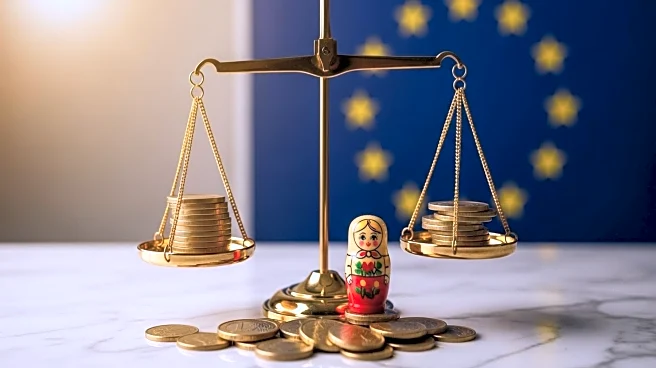What's Happening?
Italy's Economy Minister Giancarlo Giorgetti has highlighted the need for careful assessment of a European Union proposal to utilize frozen Russian assets to aid Ukraine. This statement was made during an informal Ecofin meeting in Copenhagen. Additionally, Giorgetti announced that Italy's budget deficit might fall below the EU's ceiling of 3% of GDP this year, ahead of schedule. He also noted that the current strength of the euro poses a challenge to the bloc's exports. These developments come amid Fitch's upgrade of Italy's credit rating, reflecting political stability and improved public finances under Prime Minister Giorgia Meloni's government.
Why It's Important?
The EU proposal to use frozen Russian assets for Ukraine could have significant geopolitical and economic implications, potentially affecting EU-Russia relations and the financial landscape in Europe. Italy's potential reduction in budget deficit below the EU threshold is a positive sign for its economy, indicating fiscal discipline and stability. This could enhance investor confidence and economic growth prospects. The euro's strength impacting exports is a concern for businesses relying on international trade, potentially affecting Italy's economic performance and competitiveness in global markets.
What's Next?
Italy's Treasury plans to auction up to 5 billion euros in short-term bonds and inflation-linked bonds on September 24, followed by a sale of 6-month BOT bills on September 25. The government will also offer a new BTP Valore bond for retail investors from October 20 to 24. These financial activities are part of Italy's strategy to manage its public finances and support economic growth. Banks are expected to assist the government in funding measures for the 2026 budget, reflecting a call for reciprocity due to past state support.
Beyond the Headlines
The EU's proposal to use frozen Russian assets raises ethical and legal questions about asset seizure and international law. It could set a precedent for handling assets in geopolitical conflicts, influencing future EU policies. Italy's fiscal improvements under Giorgia Meloni's government may strengthen its position within the EU, potentially affecting its influence in European decision-making processes.









